Book contents
- Frontmatter
- Contents
- Preface
- 1 Introduction: Reflective equlibrium in theory and practice
- PART I
- 2 Wide reflective equilibrium and theory acceptance in ethics
- 3 Reflective equilibrium and Archimedean points
- 4 On some methods of ethics and linguistics
- 5 Two approaches to theory acceptance in ethics
- 6 An argument about the relativity of justice
- 7 Moral theory and the plasticity of persons
- 8 Reflective equilibrium and justice as political
- PART II
- Index
3 - Reflective equilibrium and Archimedean points
Published online by Cambridge University Press: 01 February 2010
- Frontmatter
- Contents
- Preface
- 1 Introduction: Reflective equlibrium in theory and practice
- PART I
- 2 Wide reflective equilibrium and theory acceptance in ethics
- 3 Reflective equilibrium and Archimedean points
- 4 On some methods of ethics and linguistics
- 5 Two approaches to theory acceptance in ethics
- 6 An argument about the relativity of justice
- 7 Moral theory and the plasticity of persons
- 8 Reflective equilibrium and justice as political
- PART II
- Index
Summary
THE CONTRACT AND JUSTIFICATION
In A Theory of Justice, John Rawls defines a hypothetical contract situation and argues rational people will agree on reflection that it is fair to contractors. He solves the rational choice problem it poses by deriving two lexically ordered principles of justice and suggests the derivation justifies the principles. Its soundness aside, just what justificatory force does such a derivation have?
On one view, there is no justificatory force because the contract is rigged specifically to yield principles which match our precontract moral judgments. Rawls provides ammunition for this claim: “By going back and forth, sometimes altering the conditions of the contractual circumstances, at others withdrawing our judgments [about what is justl and conforming them to principle, I assume that eventually we shall find a description of the initial situation that both expresses reasonable conditions and yields principles which match our considered judgments duly pruned and adjusted.” Similarly, “We want to define the original position so that we get the desired solution.” But if the contract is thus rigged, we gain nothing over “testing” the principles directly by matching them to our considered moral judgments in reflective equilibrium. A rigged contract is redundant. What is worse, such matching of principles to judgments, some argue, tells us only that we happen to think the principles acceptable; it is a result in moral anthropology, not moral philosophy. When we add this repudiation of reflective equilibrium to the conclusion the contract is rigged, the wheels of the contract spin freely, providing no justificatory traction.
- Type
- Chapter
- Information
- Justice and JustificationReflective Equilibrium in Theory and Practice, pp. 47 - 65Publisher: Cambridge University PressPrint publication year: 1996
- 1
- Cited by



